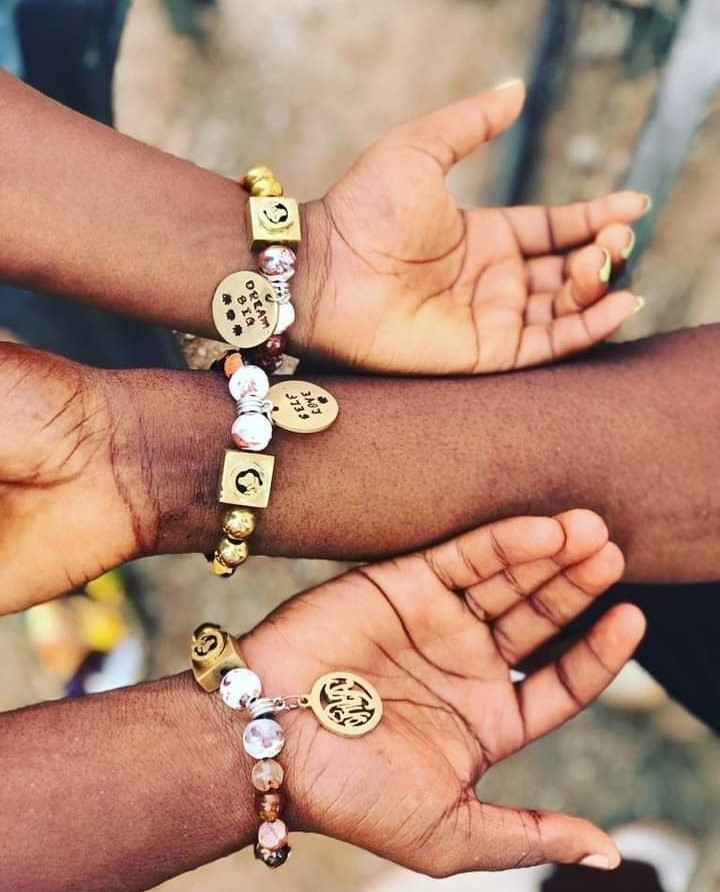A GNA News Feature by Ernest Nutsugah
Accra, July 21, GNA – It’s Wednesday afternoon at the Central Business District in Accra. Nana Amoako Mensah and his team are working under a makeshift tent at Rawlings Park at Makola.
His company, Lemonde GH, makes customised handmade jewellery and accessories, using old cedi coins and brass materials.
He has been in the business for the past five years, but the idea of starting a global brand started in 2002.
Mensah studied Business Information Systems at Zenith College and worked briefly in some public and private institutions before deciding to start his own business.
“I have a passion for arts and since the idea of starting my own business has been idle for a while, I decided to pick it up and do something. ‘Lemonde’ means ‘the world’ in French,” he tells the Ghana News Agency.
The Jeweller first learnt the rudiments of the craft at a workshop in Nima before deciding to modify and rebrand the business, which he says has been profitable over the years.
His work entails collecting, cutting and polishing old Ghana Cedi coins and other brass materials into finished products such as customised bracelets, earrings, rings, anklets, tie pins, clothing tags, waist beads, and other accessories.
“We buy the old Cedi coins, which are no longer legal tender, and then we smoothen, pierce and polish it into beautiful designs. Sometimes, we melt the coins ourselves and use it to make a flat brass material, which we cut and engrave our own designs,” he explained.
Customised bracelets sell between GH¢ 200 and GH¢300 while other accessories go between GH¢50 and GH¢250.
He also designs engagement rings when contracted.
“For the rings, there are those that are made from gold dust, pure gold and others are gold plated. Although we operate under a tent, we produce the best quality and people always wonder if [the products] are really made in Ghana. I have eyes for nice things, so we make sure our finished works are intact.”
Mensah says it takes about three to five working days to produce either a customised bracelet or ring. He has a staff of five (three boys and two girls) and says he is willing to train more people who may be interested in acquiring the skill.
The plan, according to him, is to take the business a notch higher and open sales outlets in and outside the country in the years ahead.
He looks forward to partnerships and investment so he can procure machines to speed up operations and reach more clients.
“Lemonde initially started as a clothing brand, but we later delved into making handmade jewellery and ornaments. In future, we may want to bring back the clothing and fashion aspect and exhibit our work at art festivals across the world,” he says.
Mensah’s clients are mainly individuals, who contact him personally or make requests through the business’ social media platforms.
The young man, who hails from Asamankese in the Eastern Region, speaks several local dialects in addition to French, which he says enables him to relate with customers from diverse backgrounds.
He says although times are tough, he has been able to sustain the business since its inception, acquiring the necessary tools and equipment and also paying the few people who work with him.
Speaking about the source of the old cedi coins, he says the coins used to sell at an affordable price, but the dealers have recently increased the prices due to the high demand.
Nonetheless, the entrepreneur, who considers himself a pioneer in the business of customising or branding jewellery, remains on top of his job and appears determined to make progress in the sector.
He calls for support to expand the business and engage more young people.
“I don’t follow the trends. I like coming up with my own unique designs and making them popular. What we are doing is all about creativity, so I believe the government needs to support businesses like ours.
“We need to patronise and invest in our own local businesses so we can produce, export and compete with international brands,” he urges.



